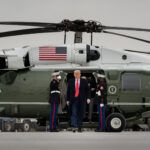Limited options: Deterring North Korea and Iran
By Lowell H. Schwartz | August 14, 2009
Over the course of the Clinton and George W. Bush administrations, the United States has tried a host of strategies to stop or slow the North Korean and Iranian nuclear programs–and in the end, none of them have worked.
The question today is no longer whether the United States can still prevent the emergence of nuclear-armed regional adversaries, but instead, how to prevent them from being empowered by their nuclear weapons. This won’t be easy.
Washington is having a difficult time accepting the increasingly limited options at its disposal. After all, this new era comes on the heels of a golden age of conventional power projection–a period when the United States could wield military power with impunity against regional powers. Especially immediately after the Cold War, the United States, acting alone or with its allies and coalition partners, could impose its will on certain errant states–e.g., Serbia or Iraq under Saddam Hussein, whose military forces weren’t of the first magnitude.
The U.S. ability to pursue aggressive actions against regional powers stemmed in part from the collapse of the Soviet Union. Once Moscow’s implicit or explicit nuclear guarantees against U.S. attack dried up, regional adversaries found themselves isolated. The fear of escalation, a constant source of concern for U.S. policy makers during the Cold War, no longer overshadowed U.S. military engagements in Eurasia.
But North Korea and Iran will present the United States with the following novel security challenges:
- Their relative paucity of material and human resources locks in their conventional military inferiority. Their leaders understand that in any serious conflict with the United States, their conventional forces and command-and-control communications would be badly damaged quickly after a conflict were to start.
- Given that military defeat would have disastrous consequences for authoritarian rulers, they may be prepared to run high risks to stave it off. As such, enemy leaders could perceive that using a nuclear weapon may be their most attractive option when faced with defeat.
- U.S. forces have demonstrated both the capability and will to attack enemy leaders from the outset of a conflict. Fears of a decapitation strike could put an enemy leader in what they perceive as a “use it or lose it” situation, prompting them to resort to nuclear use early in a conflict.
In short, deterrence of nuclear use through the threat of retaliation–a mainstay of Cold War military strategy–is highly problematic with nuclear-armed regional adversaries. The reason is simple: These leaders may believe their sole chance of surviving is brandishing or using nuclear weapons. Indeed, they might choose to abstain from nuclear use only if they felt that course would enable them and their regimes to survive intact.
This doesn’t mean that regional adversaries will be spoiling for a fight with their neighbors or the United States once they acquire a nuclear arsenal. The risks of taking on the world’s most powerful state will remain substantial. So the military superiority that the United States enjoys, in both conventional and nuclear forces, will remain valuable as a deterrent to aggression.
That said, these new nuclear adversaries may be more likely to challenge U.S. interests and probe the limits of U.S. tolerance. Thus, should conflict occur, it would carry costs and risks for the United States and its allies that are exponentially greater than those associated with conflicts that have occurred since 1990. This reality will limit U.S. freedom of action: Military operations that have become mainstays of the U.S. military repertoire, such as large-scale invasions leading to regime change or intensive air campaigns aimed at crippling the adversary, are likely to be off the table.
Instead, U.S. policy makers will be compelled to reacquaint themselves with stratagems that were prevalent during the Cold War: limited war and escalation management. In doing so, U.S. and allied decision makers in regional crises should seek to devise policy options that avoid putting the enemy leadership in a position where nuclear use seems to them to be the least bad option available.
Together, we make the world safer.
The Bulletin elevates expert voices above the noise. But as an independent nonprofit organization, our operations depend on the support of readers like you. Help us continue to deliver quality journalism that holds leaders accountable. Your support of our work at any level is important. In return, we promise our coverage will be understandable, influential, vigilant, solution-oriented, and fair-minded. Together we can make a difference.
Topics: Opinion















